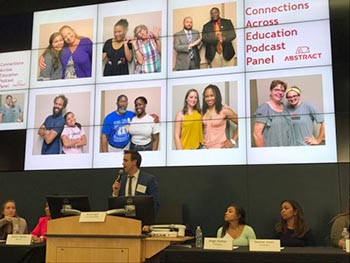Dr. Naff's push for practical research on education
By Patricia Cason
VCU Division of Community Engagement
December 21, 2018

Connections Across Education podcast series at the
2018 MERC conference.
When David Naff was a public school counselor at Mount Tabor High School back in 2010, about twenty percent of the students he worked with were at risk of not graduating on time. Naff worked in a mixed income school and noticed most of those struggling to graduate were racial minority students from low income backgrounds. Naff didn’t understand the reasons for this phenomena and wanted to learn more. Now, working for VCU’s School of Education, he is in a position to not only find answers but make change.
Naff currently serves as the assistant director of research and evaluation for the Metropolitan Educational Research Consortium or MERC. Established in 1991, MERC is a partnership between VCU’s School of Education and seven school divisions in the Richmond metro area. Instead of choosing what to study, MERC researchers like Naff conduct studies school divisions identify as important to resolve issues and influence policy decisions. In recent years, MERC has initiated studies about the contexts of cultural diversity in professional development, racial disparities in school discipline and teacher morale. Their latest project tackles the challenge of teacher retention.
“When I got into research, I wasn't very interested in doing research for my own sake or just to get papers published," Naff said. "It needed to be something that I knew had some sort of a practical benefit."
This began with his personal research about barriers first-generation college students face, a topic that came out of his experience as a counselor, and culminated in his research with MERC.
Naff said it’s important to communicate research in an interesting way for it to have maximum impact. One of the ways MERC tries to do this is by putting out smaller reports during the course of the study so people aren’t overwhelmed by a massive report at the end. Naff said they “don't take away from the rigor of the research, but we also make sure to write it in a way where it makes sense at the practitioner level.”
One of the most important ways MERC circulates their research is via a yearly conference; the 15th annual conference was held this past October and had “Connections Across Education” as its theme. Naff chairs the committee that plans the conference and describes it as their biggest event of the year. Attendance at the conference is diverse, ranging from Atif Qarni, the Virginia Secretary of Education, to high school students that want to become teachers. The conference is one of Naff’s favorite things about MERC, and he said it’s “really valuable to create a space where a superintendent could be sitting with a K-12 student or a college student or an educational researcher talking about issues from their own perspectives.”
MERC has also been putting out a podcast series called “Abstract” since the fall of 2016. Naff said the podcast began as a way to include the public in discussions researchers and educators were having, but has evolved into a platform that also highlights the good things that are happening in public schools. The most recent series, Connections Across Education, showcases special relationships between students and educators. Episodes range from a student dropping out of high school and coming back because of the relationship she had with her alternative education teacher to a teacher that made an effort to emphasize diversity for a gifted African-American student in a predominantly White classroom. Naff said “people need to hear about hard things that are happening, but they also need to hear about good news that's happening in our school divisions. And I think our podcast helps us kind of integrate both.”
Naff calls MERC a “really great idea that not enough people know about yet.” The division is trying to raise their profile so more people know what they’re doing, and their research can impact more policy decisions. Naff said “community engagement is the foundation of the work that we do,” as MERC’s strength is that it connects researchers from the VCU School of Education with local schools. Because of this, MERC is able to investigate relevant issues, as they work closely with the educators and administrators that experience problems firsthand.
Between completing community-engaged research, putting out a podcast and organizing their annual conference, Naff and the MERC team are consistently busy. “Research is built on relationships and having multiple perspectives and that's what we're focused on,” Naff said.
Comprehensive information on MERC’s work can be found at their website.
This article is no longer available on the VCU Division of Community Engagement website